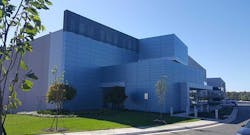Dulles Land Buy Gives Digital Realty Runway for Data Center Expansion
Digital Realty is known for making big moves on the industry’s biggest stage. It continued that strategy this week with a deal to acquire more than 400 acres of land for a future data center campus in Loudoun County, the nexus of the cloud cluster in Northern Virginia.
The purchase of the property near Dulles Airport provides the company with a long-term runway for growth in the world’s largest data center market.
Under a deal approved Tuesday by the Metropolitan Washington Airports Authority, Digital Realty will pay $236 million to acquire 424 acres of land just west of Dulles Airport known as the Western Lands. Digital Realty, the world’s largest operator of data centers, outbid several competitors to win the deal, which is expected to close in the next month.
The purchase comes amid a period of active “land banking” in Northern Virginia, as data center developers scramble to acquire property for future development amid torrid demand from both cloud computing companies and the enterprise sector. The region is seeing unprecedented activity in both leasing and new construction, with new players entering the market and established companies looking to expand.
Amid that growth, data center development is beginning to spread outward from “Data Center Alley,” the cluster of data centers around the Equinix connectivity hub in Ashburn. The Western Lands purchase is the largest deal yet in an emerging data center corridor in southeastern Loudoun, adjacent to Dulles Airport and Route 50.
A Data Center Colossus, in Ashburn & Beyond
Digital Realty is the world’s largest data center operator, with 198 data centers spanning more than 32 million square feet of space around the global. Its largest concentration of data centers is in Northern Virginia, including more than 370 megawatts of capacity spread across two existing campuses in Ashburn, Digital Ashburn and the Ashburn Corporate Center (ACC).
A third huge campus, the 243-acre Digital Loudoun, was launched last year and is already delivering data center space to customers in two huge buildings. The company has another 63 megawatts of space under construction, with 87 percent pre-leased, and capacity to add another 390 megawatts, according to CEO Bill Stein.
“We have leased more than 100 megawatts of capacity in Northern Virginia over the past 12 months, and we continue to see broad-based demand going forward,” said Digital Realty Senior Vice President of Acquisitions Michael Darragh. This land acquisition provides the foundation for Digital Realty’s next phase of growth in Northern Virginia and will enable us to continue to support years of customer expansion, while broadening our positive impact on the local economy.”
The strategic importance of the hyperscale market in Ashburn was underscored in Digital Realty’s largest M&A deal, the 2017 acquisition of DuPont Fabros Technology (DFT) for $7.6 billion. DFT was Digital’s primary competition in Ashburn, where its nine-building ACC data center campus was filled with marquee tenants like Facebook, Microsoft, Apple and Rackspace. The deal consolidated power for Digital Realty in Northern Virginia, and seems even more prescient in light of the acceleration of demand in Ashburn in 2018.
With land in Ashburn being bought up, Digital Realty has recently begun looking beyond Data Center Alley to ensure it has room to expand in neighboring markets in Northern Virginia. In June the company purchased a 62-acre parcel in Manassas for $16.5 million, which can support up to 1.7 million square feet of data center buildings and 192 megawatts of capacity. The deal marks Digital Realty’s first foray into Prince William County, which has seen strong growth as a more affordable alternative to Ashburn.
A row of standby generators outside the first phase of Building L on the new Digital Realty campus in Ashburn, Va. (Photo: Rich Miller).
This week’s deal with the airport authority provides even more room to expand. The 424-acre parcel is larger than any of Digital Realty’s three existing campuses in Data Center Alley. This offers long-term growth for Digital Realty’s customers, who are provisioning data center capacity to keep pace with rapid growth in their cloud computing business.
“Customers are looking for long-term commitment, along with the flexibility to support their deployments and connection nodes, as well as the ability to land and expand within the same location – all of which align perfectly with our Connected Campus strategy,” said Stein.
To accommodate that growth, Digital Realty is among the developers employing a hybrid leasing strategy which combines two approaches to data center leasing – powered shell and turn-key space – to enable cloud builders to secure expansion space in strategic markets, while deploying capital on a pay-as-you-go-basis.
Jonathan Litvany, the Global Sales Director for Digital Realty, likens this approach to a “frequent buyer program” in which hyperscale customers can deploy 6 megawatts every six months or so. “It’s a logical approach to matching demand and construction,” said Litvany.
Land Banking Continues Apace
A number of key business drivers have aligned in Northern Virginia, including new customers and new providers entering the market, a dwindling supply of premium development sites, and the rising cost of land. As the concentration of cloud capacity in the region reaches critical mass (especially for Amazon Web Services) space in Ashburn has become the table stakes for companies with serious ambitions in cloud computing.
“Companies have bought land thinking it would give them five or six years of runway, and it winds up being used up in two to three years,” said Rizer. “Even though the price of entry has increased in our market, we’re seeing new entries. People still need and want to be here.”
That trend is visible in the recent announcements that Cologix, Aligned Energy, EdgeCore Internet Real Estate and Chirisa Tech Centers have all acquired land for data center campuses in Data Center Alley. All four companies are new players in Northern Virginia.
CloudHQ, Iron Mountain and Element Critical entered the Northern Virginia market in 2017, and Vantage Data Centers, Compass Datacenters and QTS Data Centers have all jumped into the market with large new campuses scheduled to open in 2018 and 2019.
About the Author



